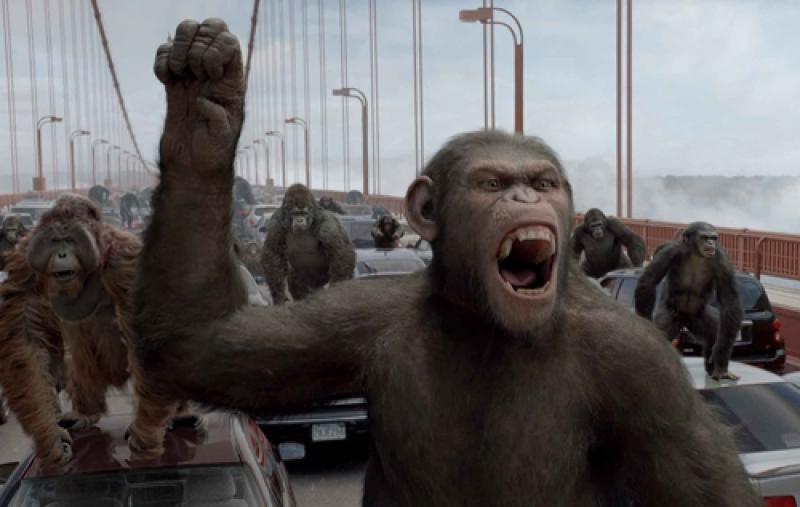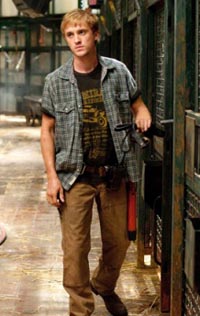Rise of the Planet of the Apes | reviews, news & interviews
Rise of the Planet of the Apes
Rise of the Planet of the Apes
San Francisco is overrun by motion-capture monkeys in Apes revival

Ever since the first Planet of the Apes film in 1968, in which astronaut Charlton Heston landed on a futuristic Earth being run by super-evolved apes, the idea has become a sci-fi staple, breeding a string of sequels, spin-offs and TV series. Tim Burton remade the original flick in 2001, but despite enjoying commercial success, it was viewed with contempt by Apes cognoscenti.
Better luck this time? Director Rupert Wyatt's new foray into simian mythology takes its cue from 1972's Conquest of the Planet of the Apes, in which monkey mastermind Caesar led an ape rebellion against humankind, but dispenses with all the time-travel stuff and restarts the story in present-day San Francisco. Wyatt's secret weapon is motion capture technology, now sophisticated enough to allow an actor in a high-tech suit to participate in live action scenes with other cast members. Thus, Andy Serkis gets to follow up his previous roles as King Kong and Gollum by playing the brainy Caesar, destined to become the primate messiah.
The set-up is that scientist Will Rodman (James Franco) has developed a serum to combat Alzheimer's disease, and has been testing it on apes in the labs of pharmaceutical company Gen-Sys. Will is optimistic - he reckons his ALZ 112 product promotes "full cognitive recovery" - but he's right in the middle of a crucial presentation to investors when his test ape, Bright Eyes, runs amok and has to be shot dead. Will's unpleasant boss, Steven Jacobs (David Oyelowo, wielding a cold English accent like a scalpel) instantly closes down the project and orders all the research apes to be killed. A distraught Will can't bring himself to terminate Bright Eyes's baby, and smuggles him away to his own home.
 Writers Rick Jaffa and Amanda Silver give the story a personal twist via Will's dad, Charles (John Lithgow), a music teacher suffering from Alzheimer's, his decline evoked in his shambolic piano playing. When it dawns on Will that the baby ape, Caesar, has inherited intellect-enhancing qualities from the ALZ 112 fed to his mother, he tries the stuff on pop, with instantaneous results. Suddenly the old boy is haring up and down the keyboard like Lang Lang, his brain restored to shimmering clarity.
Writers Rick Jaffa and Amanda Silver give the story a personal twist via Will's dad, Charles (John Lithgow), a music teacher suffering from Alzheimer's, his decline evoked in his shambolic piano playing. When it dawns on Will that the baby ape, Caesar, has inherited intellect-enhancing qualities from the ALZ 112 fed to his mother, he tries the stuff on pop, with instantaneous results. Suddenly the old boy is haring up and down the keyboard like Lang Lang, his brain restored to shimmering clarity.
An idyllic period of anthropomorphic bliss ensues, with Caesar becoming an adored family member with ever-increasing mental capacity. He even helps Will to find a new girlfriend, glamorous (though vacuous) vet Caroline (Freida Pinto, pictured above with Franco). One striking sequence sees Caesar climbing a giant redwood tree, gradually maturing through a series of dissolves until he emerges into brilliant sunlight, an adult ape looking out over a panorama of San Francisco bay.
 Of course it can't last. When Caesar is banged up in a barbaric primate shelter after saving a sick-again Charles from an irate neighbour, where he's abused by sadistic Tom "Draco Malfoy" Felton (pictured left), it's clear that the barrier between humans and apes can never dissolve entirely. Caesar is so clever that he's able to steal Will's new version of his serum, which leads in short order to a ready-to-go army of ape-revolutionaries, ready for pitched battle with the cops on the Golden Gate bridge.
Of course it can't last. When Caesar is banged up in a barbaric primate shelter after saving a sick-again Charles from an irate neighbour, where he's abused by sadistic Tom "Draco Malfoy" Felton (pictured left), it's clear that the barrier between humans and apes can never dissolve entirely. Caesar is so clever that he's able to steal Will's new version of his serum, which leads in short order to a ready-to-go army of ape-revolutionaries, ready for pitched battle with the cops on the Golden Gate bridge.
American critics have been showering Rise of... with superlatives, though on closer inspection that's mostly because of the technology (some imaginative souls are even tipping Serkis for an Oscar). I found the first half vastly more compelling than the latter stages. The plot is a compilation of Apes-isms and familiar sci-fi riffs (Deep Blue Sea and its Alzheimer's research on unfeasibly smart sharks springs to mind), and the characterisations might charitably be described as clichéd, but the story clatters along amusingly, while Serkis's ape-apotheosis is by no means the least lifelike performance on display. On the other hand, Caesar is still never naturalistic enough for you to forget that it's all a technical tour de force rather than a real talking ape with a Che Guevara complex.
The script laboriously flags up a number of issues designed to provoke a furrowed brow in the viewer, such as the ethical treatment of animals or the moral limits of scientific research - "You're trying to control things not meant to be controlled," Caroline warns Will sternly - but the darkly satirical tone of the original films has been smothered by a sense of environmentally aware worthiness. By the time we reach the later scenes of apes on the rampage, Wyatt has effectively handed the whole thing over to the animators and digital compositors. It's state of the science, but not state of the art.
Overleaf: watch the trailer for Rise of the Planet of the Apes
Share this article
Add comment
The future of Arts Journalism
You can stop theartsdesk.com closing!
We urgently need financing to survive. Our fundraising drive has thus far raised £49,000 but we need to reach £100,000 or we will be forced to close. Please contribute here: https://gofund.me/c3f6033d
And if you can forward this information to anyone who might assist, we’d be grateful.

Subscribe to theartsdesk.com
Thank you for continuing to read our work on theartsdesk.com. For unlimited access to every article in its entirety, including our archive of more than 15,000 pieces, we're asking for £5 per month or £40 per year. We feel it's a very good deal, and hope you do too.
To take a subscription now simply click here.
And if you're looking for that extra gift for a friend or family member, why not treat them to a theartsdesk.com gift subscription?
more Film
 Bugonia review - Yorgos Lanthimos on aliens, bees and conspiracy theories
Emma Stone and Jesse Plemons excel in a marvellously deranged black comedy
Bugonia review - Yorgos Lanthimos on aliens, bees and conspiracy theories
Emma Stone and Jesse Plemons excel in a marvellously deranged black comedy
 theartsdesk Q&A: director Kelly Reichardt on 'The Mastermind' and reliving the 1970s
The independent filmmaker discusses her intimate heist movie
theartsdesk Q&A: director Kelly Reichardt on 'The Mastermind' and reliving the 1970s
The independent filmmaker discusses her intimate heist movie
 Blu-ray: Wendy and Lucy
Down-and-out in rural Oregon: Kelly Reichardt's third feature packs a huge punch
Blu-ray: Wendy and Lucy
Down-and-out in rural Oregon: Kelly Reichardt's third feature packs a huge punch
 The Mastermind review - another slim but nourishing slice of Americana from Kelly Reichardt
Josh O'Connor is perfect casting as a cocky middle-class American adrift in the 1970s
The Mastermind review - another slim but nourishing slice of Americana from Kelly Reichardt
Josh O'Connor is perfect casting as a cocky middle-class American adrift in the 1970s
 Springsteen: Deliver Me From Nowhere review - the story of the Boss who isn't boss of his own head
A brooding trip on the Bruce Springsteen highway of hard knocks
Springsteen: Deliver Me From Nowhere review - the story of the Boss who isn't boss of his own head
A brooding trip on the Bruce Springsteen highway of hard knocks
 The Perfect Neighbor, Netflix review - Florida found-footage documentary is a harrowing watch
Sundance winner chronicles a death that should have been prevented
The Perfect Neighbor, Netflix review - Florida found-footage documentary is a harrowing watch
Sundance winner chronicles a death that should have been prevented
 Blu-ray: Le Quai des Brumes
Love twinkles in the gloom of Marcel Carné’s fogbound French poetic realist classic
Blu-ray: Le Quai des Brumes
Love twinkles in the gloom of Marcel Carné’s fogbound French poetic realist classic
 Frankenstein review - the Prometheus of the charnel house
Guillermo del Toro is fitfully inspired, but often lost in long-held ambitions
Frankenstein review - the Prometheus of the charnel house
Guillermo del Toro is fitfully inspired, but often lost in long-held ambitions
 London Film Festival 2025 - a Korean masterclass in black comedy and a Camus classic effectively realised
New films from Park Chan-wook, Gianfranco Rosi, François Ozon, Ildikó Enyedi and more
London Film Festival 2025 - a Korean masterclass in black comedy and a Camus classic effectively realised
New films from Park Chan-wook, Gianfranco Rosi, François Ozon, Ildikó Enyedi and more
 After the Hunt review - muddled #MeToo provocation
Julia Roberts excels despite misfiring drama
After the Hunt review - muddled #MeToo provocation
Julia Roberts excels despite misfiring drama
 London Film Festival 2025 - Bradley Cooper channels John Bishop, the Boss goes to Nebraska, and a French pandemic
... not to mention Kristen Stewart's directing debut and a punchy prison drama
London Film Festival 2025 - Bradley Cooper channels John Bishop, the Boss goes to Nebraska, and a French pandemic
... not to mention Kristen Stewart's directing debut and a punchy prison drama
 Ballad of a Small Player review - Colin Farrell's all in as a gambler down on his luck
Conclave director Edward Berger swaps the Vatican for Asia's sin city
Ballad of a Small Player review - Colin Farrell's all in as a gambler down on his luck
Conclave director Edward Berger swaps the Vatican for Asia's sin city

Comments
...